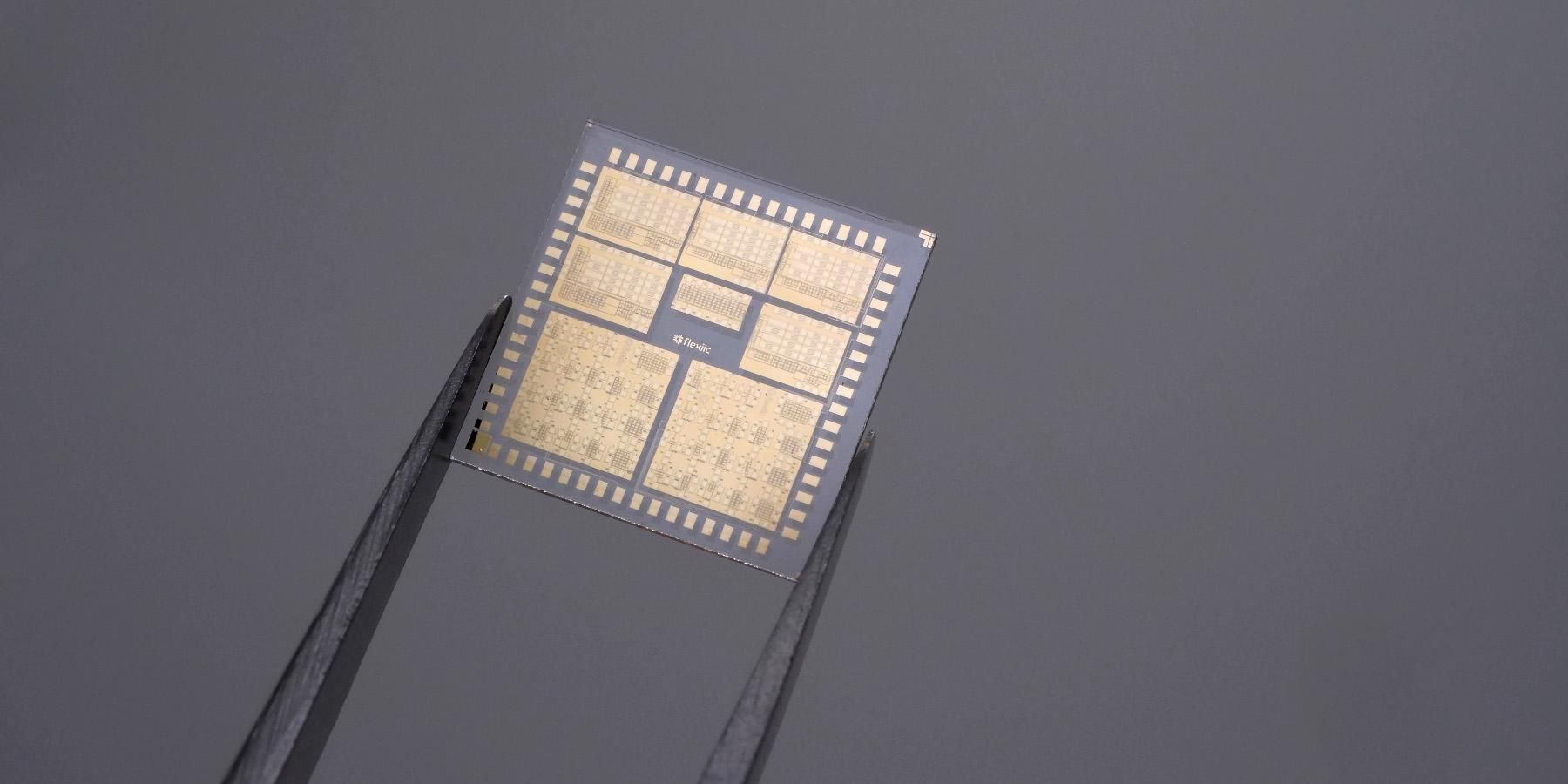A CSIC spin-off company to develop flexible carbon-based chips for monitoring sensors
The spin-off FlexiiC aims to design system-on-chip (SoC) solutions applied to intelligent systems and the Internet of Things. Its mission is to democratize and reinvent the world of electronics through a revolutionary organic and flexible technology, which will enable a new generation of sensors and logic circuits processed with functional inks at low temperatures on sustainable substrates.

Integrated circuit fabricated over functional and organic materials. FlexiiC.
Can you imagine a flexible and sustainable chip or integrated circuit? This is possible thanks to organic microelectronics, an innovative technology that eliminates the use of toxic and expensive materials in conventional manufacturing, allowing the creation of flexible, sustainable and very low-cost circuits. With the aim of revolutionizing the market and betting on a more sustainable electronics, FlexiiC (Flexible Integrated Circuits S.L.), the new spin-off of the Institute of Microelectronics of Barcelona of the CSIC (IMB-CNM-CSIC) is born.
Organic integrated circuits do not use silicon, the material most commonly used in chips for all electronic applications, but are based on organic materials, composed mainly of carbon and other nanomaterials in solution form. Thanks to these characteristics, they are more flexible and lighter, which allows them to adapt to curved surfaces and be applied to wearable devices, a growing trend in electronics applied to sports, among other sectors. However, being organic, they are less efficient and have a shorter useful life compared to conventional silicon circuits. In addition, their manufacture requires fewer process steps and does not demand environments as pure as those needed for silicon chips, allowing their expected final cost to be less than one euro cent.
“FlexiiC leverages these characteristics to focus its business model on the development of flexible integrated circuits for smart, disposable, short-lifetime monitoring systems for medical and healthcare, packaging and environmental applications,” says Eloi Ramon, one of the company's founders and principal investigator of the Integrated Circuits and Systems (ICAS) group at IMB-CNM. “The company will offer System-on-Chip (SoC) systems with customizable sensor interfaces, processing and data transmission capabilities, specifically designed for applications where low cost, single or transient use and sustainability are key factors,” he adds.
Design and commercialization of the first chips
The first marketable chip is planned for the end of 2025 and will be integrated into a food packaging monitoring system, which will include licensed technology that is currently being developed to reach higher technology maturity levels (TRL) in collaboration with IMB-CNM-CSIC. The licensed patent has been patented by CSIC together with the Universitat de Girona (UdG), the Universidade do Algarve (UAlg) and the Instituto de Telecomunicações (IT) of Portugal.
FlexiiC recently signed a multi-year agreement with UK-based Smartkem Ltd to develop custom integrated circuits using its organic thin-film transistor (OTFT) technology, which have the potential to revolutionize the market. These devices are expected to incorporate mixed-signal and digital circuits, such as RISC-V (free hardware instruction set architecture) cores, as well as integrate machine learning (ML), a type of artificial intelligence (AI) that allows machines to learn and improve from data without the need to be explicitly programmed to optimize signal processing.
FlexiiC's products will be manufactured at Smartkem's facility in Manchester, UK. The company also offers prototyping services at the Process Innovation Center (PIC) in Sedgefield, UK, and has a field applications office in Taiwan.
Technology transfer to reach society
FlexiiC brings together research personnel specialized in organic electronics and chip design.
“This agreement is the result of a joint effort that strengthens the ties between Spain and Portugal in the field of research for innovation, and demonstrates our firm commitment from the public sector to knowledge transfer,” adds Isabel Gavilanes, Transfer Manager at CSIC's Vice-Presidency for Innovation and Transfer. “From our Vice-Presidency we promote innovative technologies in key sectors in Spain, such as microelectronics, photonics or quantum technologies among others, and therefore we support the creation of new knowledge-based companies, such as FlexiiC. From CSIC we will continue to collaborate with FlexiiC through new public-private collaboration projects that provide more value and benefit its end user: society,” she concludes.
IMB-CNM has given technological support to the creation of multiple spin-offs over the years. Some of the companies currently commercializing products are Alibava Systems, A4CELL (Arrays for Cell Nanodevices) and Sweanty.
“Este acuerdo es el resultado de un esfuerzo conjunto que refuerza los lazos entre España y Portugal en el ámbito de la investigación para la innovación, y demuestra nuestro firme compromiso desde lo público con la transferencia de conocimiento”, agrega Isabel Gavilanes, gestora de Transferencia en la Vicepresidencia de Innovación y Transferencia del CSIC. “Desde nuestra Vicepresidencia impulsamos tecnologías innovadoras en sectores clave en España, como son la microelectrónica, la fotónica o las tecnologías cuánticas entre otros, y por ello apoyamos la creación de nuevas empresas de base en el conocimiento, como FlexiiC. Desde el CSIC seguiremos colaborando con FlexiiC a través de nuevos proyectos de colaboración público-privada que aporten más valor y beneficien a su usuario final: la sociedad”, concluye.
El IMB-CNM ha dado apoyo tecnológico a la creación de múltiples spin-offs a lo largo de los años. Algunas de las empresas que actualmente comercializan productos son Alibava Systems, A4CELL (Arrays for Cell Nanodevices) y Sweanty.




